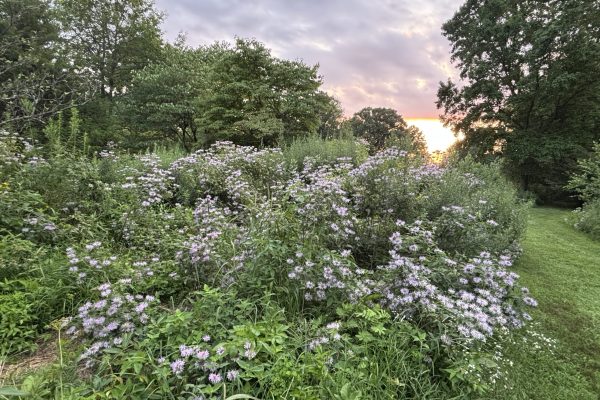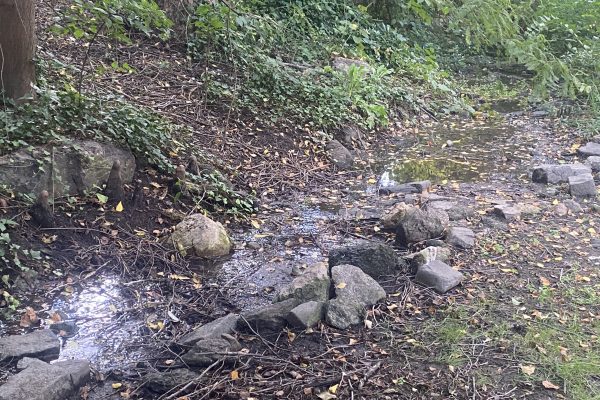The Shehekhiyanu prayer has been my favorite for over 40 years; I’m always seeking opportunities to say it as an expression of gratitude and appreciation. It always accompanies wearing new clothes or jewelry, trying a new food, hearing great news from a friend, getting married (at age 50!), and the first rains after a drought.
In July 2018, I was diagnosed with ALS, a degenerative and terminal muscle wasting disease; it’s a devastating realization. My partner and I went for a trip to Italy several months after the diagnosis, to heal, have some quiet time together, and going on my last hikes. When we arrived at the airport to return home, we learned that the departure gate was about a mile away. At that point, my body was exhausted and we didn’t have the time needed for me to walk that far. The airlines offered a wheelchair and an assistant, and we gratefully accepted. I appreciated that the wheelchair existed and was available to get me where I needed to go, but it was a painful reminder of what my body could no longer do. Feeling grateful, but not celebratory, I just couldn’t say the Shehechiyanu in that moment, even though it was clearly a moment that needed a sacred response.
And since then, there have been other wonderful technological solutions that have enabled me to live as fully as possible (a rollator which allowed me to continue hiking with a seat for breaks, a battery powered stair lift that transports me up and down between floors, gadgets to button and zip my clothes, and a special computer that uses an eye gaze technology that allows me to speak when my voice and hands no longer work).
For each of these situations, I have been deeply appreciative that technologies existed, I had the financial means to purchase them, and they eased my way, but I still couldn’t quite utter Shehekhiyanu when I first used them.
I realized that the Shehekhiyanu prayer represents, for me, an experience of celebration, joy, excitement, and looking forward to new beginnings. Dealing with ALS is a continual process of loss, adjusting, adapting, and making peace with diminished abilities – it’s hard to truly celebrate that reality. I want to stay mindful and grateful when I find ways of adapting to new limitations, but it’s always balanced with the realization of loss and grief.
There are other situations when people may want to liturgically acknowledge a new, yet imperfect situation:
-
Receiving first unemployment check, accepting that one is out of a job and steady paycheck, and grateful that there will be some money to cover financial needs
-
Starting chemotherapy or other drug regimen, acknowledging that one has a serious medical condition, and grateful that there is a treatment that may provide a cure
-
Being fitted with a prosthetic limb, acknowledging the physical body loss, and grateful that some functionality will be possible.
-
Entering hospice, acknowledging that one is entering the final stage of life, and grateful that there are people and organizations who provide a loving and caring environment
I needed a way to spiritually acknowledge and accept these transitional moments which are a mixed blessing. The first two parts of the Shehekhiyanu (“SShehekhiyanu v’kimanu”/”Who has kept us alive, sustained us”), still deeply resonate for me. Facing a terminal diagnosis, these words are even more powerful for me today; I am so deeply grateful for each day of life, each birdsong, each new flower blooming, each loving hug, and am trying to squeeze as much life out of each day as I can.
I have adapted the third part of the Shehekhiyanu prayer (“V’Higiyanu lazman hazeh”/”Who has brought us to this moment”), with a few variations so I can continue my Shehekhiyanu practice wholeheartedly moving forward. I’ve kept the plural format of the original Shehekhiyanu:
-
Who has eased our way – v’hinichanu (literally means “Who has guided me to an easier place”)
-
Who has provided support –u’t’michanu
-
Who reminds us that we’re not alone- v’holech imanu(from Deut. 31:6)
-
Who dwells with us – v’shokhen imanu bah-zman ha-zeh
-
Who has not abandoned us – she-lo azavanu
-
Who has comforted us – v’ni-chamanu
With hope this reflection provides consolation to others facing difficult transitions.
With deep appreciation to Rabbi Elyse Goldstein and Baruch Sienna for their support and help with the Hebrew translations.











